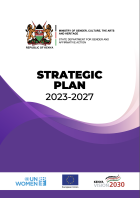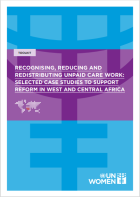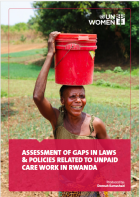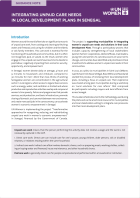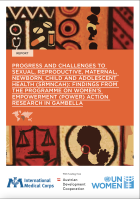1 - 20 of 25 Results
Pagination
Date:
The 'Gender and water (in)security in agricultural production in East Africa' focuses on the gender dynamics governing access to, use and control over rain water and irrigation used for productive livelihoods in agriculture in the countryside of Ethiopia, Kenya and South Sudan; how rural institutional arrangements and climate change impacts productive water use by women and men in agriculture, how gendered access to irrigation is impacted by the social norms that shape governance structures; and the policy responses needed to equitably respond to these gender challenges.
Date:
The transition to a low carbon economy is leading to important socioeconomic transformation in sub-Saharan Africa. The green transition can help governments align their development strategies. Gender equality and women’s and youth employment are critical priorities. This toolkit helps stakeholders involved in the process of formulation or revision of climate change and green policies (i.e. NDCs or NAPs) to identify opportunities to maximize co-benefits of gender equality and climate action.
Date:
Discover the key insights and milestones of the Beijing Declaration and Platform for Action (BPfA) as we approach its 30th anniversary in 2025. This publication explores progress made, persistent challenges, and Kenya’s contributions to gender equality. Highlighting actionable steps for individuals and organizations, it connects the BPfA to the Sustainable Development Goals, emphasizing its continued relevance in driving transformative change for women and girls globally.
Date:
This Care Framework highlights the context and challenges of women's unpaid care work in the West and Central Africa region. It also describes UN Women's approach to the care economy to address unpaid care within the context of the SDGs and the polycrisis in the region, and enabling gender equality and economic justice for rural and poor women.
Date:
The Publication is a detailed strategic plan for the period 2023-2-27. It highlights previous achievements, lessons and emerging issues that define the policy direction of the gender sector achieving a society free from gender discrimination and violence
Date:
This brief emerges from the Assessment of Women's Movement in Africa, and it shows that African states and public institutions are – as a result of the efforts of the women’s movement – increasingly becoming gendered, and a greater number of women are making inroads into the continent’s corridors of power.
Date:
This advocacy notes outlines the most recent data on women's access to finance in Africa and indicates what policymakers, civil soiety organisation and financial institutions can do to improve women entrepreneurs' situation in accessing green finance.
Date:
This Regional Coordination Strategy articulates how UN Women will leverage its unique triple mandate—encompassing normative support, UN system coordination, and operational activities—to mobilize urgent and sustained action to achieve gender equality and the empowerment of all women and girls and support the achievement of the 2030 Agenda.
Date:
This report highlights the existing social care infrastructure, and the most needed and cost-effective solutions that can contribute to the reduction and redistribution of unpaid care work in Rwanda.
Date:
The objectives of the gender audit are to document the progress, achievements, and challenges faced by women in the run up and during the 2021 elections and capture actual experiences particularly the impacts of electoral system on women’s political participation and representation in political and electoral processes. The publication captures progress and critical emerging issues experienced in the elections and, highlights the impact of the electoral system on women’s equitable participation in the elections giving recommendations for improving the status quo / electoral processes.
Date:
This Policy Brief will explore the results of the mapping of the women’s movement, and the weaknesses, strengths and recommendations of the current civil-society movement as identified during the National Forum and analysis of the mapping.
Date:
Unpaid care work by women is one of the most important constraints they face in running their businesses or advancing in their careers. This toolkit presents a compilation of case studies that have been selected to support governments and civil society in dialogue around the implications of unpaid care work on women’s lives and countries development outcomes and for positioning (unpaid) care reform in a more central role in policies in the region.
Date:
Women’s unpaid care responsibilities are one of the main barriers preventing women from fully profiting from new jobs created in the green economy and is limiting their contribution to climate change mitigation and adaptation. Therefore, this brief calls for action on adopting appropriate public policies to ensure that women get an equitable share of green jobs; balancing men’s and women’s responsibilities for care; supporting private sector development in the care sector to scale-up promising solutions and increasing access to time-saving and energy-efficient infrastructure.
Date:
This infographic is based on the results of an assessment of rural women's needs, carried out as part of UN Women's 3R Program in Senegal. It illustrates the challenges of unpaid care work faced by rural women, as well as innovative solutions and policy measures to address these needs, and to recognize, reduce and redistribute rural women's unpaid care work.
Date:
From cooking and cleaning, to fetching water and firewood or taking care of children and the sick and the elderly, women do at least two and a half times more unpaid household and care work than their counterparts. As a result,they have less time to engage in paid labour due to working longer hours,combining paid and unpaid labour.
Date:
In Senegal, UN Women is supporting municipalities in integrating women’s unpaid care needs and solutions in their Local Development Plans. UN Women developed a methodology for identifying and analysing community care needs and for developing and financing solutions to those needs. This Guidance Note documents the methodology and can be a technical resource for municipalities and local stakeholders willing to integrate care provisions into their local development plans.
Date:
29th of June 2022, the electoral law of DRC was enacted by the CENI (National Independent Electoral Commission). Article 13 paved the way for equality in Congolese politics, with new voluntary incentive mechanisms to encourage women's political participation. Nevertheless, the law differs from the practice and women continue to represent only 10% of the National Assembly.
This policy brief will offer a summary of the changes the electoral reform has brought about, and will reflect upon its evolution, achievements, and the likely challenges for the 2023 elections.
Date:
The intention of the book is three-fold: 1) to help those who have not yet made positive behavioral changes by providing motivation and insight, 2) to assist those who are currently attempting to change behaviour, and 3) to serve as a source of hope and support for those who have tried and have taken the decision to change but are still facing challenges.
Date:
Drawing on an assessment of the needs of rural women in Senegal, Mali, Liberia, Malawi and Haiti, and on an ecosystem mapping and market dialogue process, these infographics illustrate the challenges that rural women face to access resilience-building services that are tailored to their needs, and provide insights into gender-responsive policy measures and innovative solutions to respond to the women’s needs and build their resilience to climate change and disasters.
Date:
UNWomen, in collaboration with International Medical Corps (IMC), has been implementing a Programme on Women’s Empowerment in Sexual, Reproductive, Maternal, Newborn, and Child and Adolescent Health (SRMNCAH) Rights (POWER) in humanitarian settings in Gambella Region. The purpose of the action research is to document the progress on the SRMNCAH programme implemented in the humanitarian setting, lessons learned from it, gaps in it and efforts required for it. The findings will better inform UN Women and partners working in a humanitarian setting on the current progress and the efforts required to improve SRMNCAH services in the refugee and host communities.





